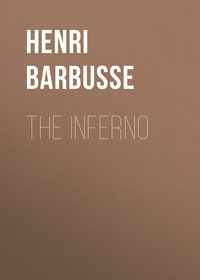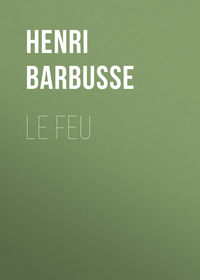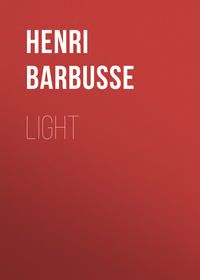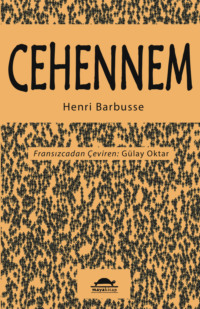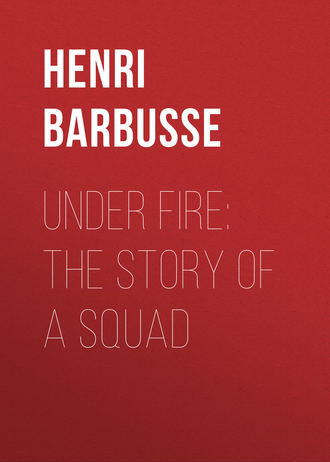 полная версия
полная версияUnder Fire: The Story of a Squad
Some of the old toilers are comical. This one whom the file brings up has bottle-shaped shoulders. Although extremely narrow-chested and spindle-shanked, he is big-bellied. He is too much for Barque. "Hullo, Sir Canteen!" he says.
When a more outrageously patched-up greatcoat appears than all the others can show, Tirette questions the veteran recruit. "Hey, Father Samples! Hey, you there!" he insists.
The other turns and looks at him, open-mouthed.
"Say there, papa, if you will be so kind as to give me the address of your tailor in London!"
A chuckle comes from the antiquated and wrinkle-scrawled face, and then the poilu, checked for an instant by Barque's command, is jostled by the following flood and swept away.
When some less striking figures have gone past, a new victim is provided for the jokers. On his red and wrinkled neck luxuriates some dirty sheep's-wool. With knees bent, his body forward, his back bowed, this Territorial's carriage is the worst.
"Tiens!" bawls Tirette, with pointed finger, "the famous concertina-man! It would cost you something to see him at the fair—here, he's free gratis!"
The victim stammers responsive insults amid the scattered laughter that arises.
No more than that laughter is required to excite the two comrades. It is the ambition to have their jests voted funny by their easy audience that stimulates them to mock the peculiarities of their old comrades-in-arms, of those who toil night and day on the brink of the great war to make ready and make good the fields of battle.
And even the other watchers join in. Miserable themselves, they scoff at the still more miserable.
"Look at that one! And that, look!"
"Non, but take me a snapshot of that little rump-end! Hey, earth-worm!"
"And that one that has no ending! Talk about a sky-scratcher! Tiens, la, he takes the biscuit. Yes, you take it, old chap!"
This man goes with little steps, and holds his pickax up in front like a candle; his face is withered, and his body borne down by the blows of lumbago.
"Like a penny, gran'pa?" Barque asks him, as he passes within reach of a tap on the shoulder.
The broken-down poilu replies with a great oath of annoyance, and provokes the harsh rejoinder of Barque: "Come now, you might be polite, filthy-face, old muck-mill!"
Turning right round in fury, the old one defies his tormentor.
"Hullo!" cries Barque, laughing, "He's showing fight; the ruin! He's warlike, look you, and he might be mischievous if only he were sixty years younger!"
"And if he wasn't alone," wantonly adds Pepin, whose eye is in quest of other targets among the flow of new arrivals.
The hollow chest of the last straggler appears, and then his distorted back disappears.
The march past of the worn-out and trench-foul veterans comes to an end among the ironical and almost malevolent faces of these sinister troglodytes, whom their caverns of mud but half reveal.
Meanwhile, the hours slip away, and evening begins to veil the sky and darken the things of earth. It comes to blend itself at once with the blind fate and the ignorant dark minds of the multitude there enshrouded.
Through the twilight comes the rolling hum of tramping men, and another throng rubs its way through.
"Africans!"
They march past with faces red-brown, yellow or chestnut, their beards scanty and fine or thick and frizzled, their greatcoats yellowish-green, and their muddy helmets sporting the crescent in place of our grenade. Their eyes are like balls of ivory or onyx, that shine from faces like new pennies, flattened or angular. Now and again comes swaying along above the line the coal-black mask of a Senegalese sharpshooter. Behind the company goes a red flag with a green hand in the center.
We watch them in silence. These are asked no questions. They command respect, and even a little fear.
All the same, these Africans seem jolly and in high spirits. They are going, of course, to the first line. That is their place, and their passing is the sign of an imminent attack. They are made for the offensive.
"Those and the 75 gun we can take our hats off to. They're everywhere sent ahead at big moments, the Moroccan Division."
"They can't quite fit in with us. They go too fast—and there's no way of stopping them."
Some of these diabolical images in yellow wood or bronze or ebony are serious of mien, uneasy, and taciturn. Their faces have the disquieting and secret look of the snare suddenly discovered. The others laugh with a laugh that jangles like fantastic foreign instruments of music, a laugh that bares the teeth.
We talk over the characteristics of these Africans; their ferocity in attack, their devouring passion to be in with the bayonet, their predilection for "no quarter." We recall those tales that they themselves willingly tell, all in much the same words and with the same gestures. They raise their arms over their heads—"Kam'rad, Kam'rad!" "Non, pas Kam'rad!" And in pantomime they drive a bayonet forward, at belly-height, drawing it back then with the help of a foot.
One of the sharpshooters overhears our talk as he passes. He looks upon us, laughs abundantly in his helmeted turban, and repeats our words with significant shakes of his head: "Pas Kam'rad, non pas Kam'rad, never! Cut head off!"
"No doubt they're a different race from us, with their tent-cloth skin," Barque confesses, though he does not know himself what "cold feet" are. "It worries them to rest, you know; they only live for the minute when the officer puts his watch back in his pocket and says, 'Off you go!'"
"In fact, they're real soldiers."
"We are not soldiers," says big Lamuse, "we're men." Though the evening has grown darker now, that plain true saying sheds something like a glimmering light on the men who are waiting here, waiting since the morning, waiting since months ago.
They are men, good fellows of all kinds, rudely torn away from the joy of life. Like any other men whom you take in the mass, they are ignorant and of narrow outlook, full of a sound common sense—which some-times gets off the rails—disposed to be led and to do as they are bid, enduring under hardships, long-suffering.
They are simple men further simplified, in whom the merely primitive instincts have been accentuated by the force of circumstances—the instinct of self-preservation, the hard-gripped hope of living through, the joy of food, of drink, and of sleep. And at intervals they are cries and dark shudders of humanity that issue from the silence and the shadows of their great human hearts.
When we can no longer see clearly, we hear down there the murmur of a command, which comes nearer and rings loud—"Second half-section! Muster!" We fall in; it is the call.
"Gee up!" says the corporal. We are set in motion. In front of the tool-depot there is a halt and trampling. To each is given a spade or pickax. An N.C.O. presents the handles in the gloom: "You, a spade; there, hop it! You a spade, too; you a pick. Allons, hurry up and get off."
We leave by the communication trench at right angles to our own, and straight ahead towards the changeful frontier, now alive and terrible.
Up in the somber sky, the strong staccato panting of an invisible aeroplane circles in wide descending coils and fills infinity. In front, to right and left, everywhere, thunderclaps roll with great glimpses of short-lived light in the dark-blue sky.
III
The Return
RELUCTANTLY the ashen dawn is bleaching the still dark and formless landscape. Between the declining road on the right that falls into the gloom, and the black cloud of the Alleux Wood—where we hear the convoy teams assembling and getting under way—a field extends. We have reached it, we of the 6th Battalion, at the end of the night. We have piled arms, and now, in the center of this circle of uncertain light, our feet in the mist and mud, we stand in dark clusters (that yet are hardly blue), or as solitary phantoms; and the heads of all are turned towards the road that comes from "down there." We are waiting for the rest of the regiment, the 5th Battalion, who were in the first line and left the trenches after us.
Noises; "There they are!" A long and shapeless mass appears in the west and comes down out of the night upon the dawning road.
At last! It is ended, the accursed shift that began at six o'clock yesterday evening and has lasted all night, and now the last man has stepped from the last communication trench.
This time it has been an awful sojourn in the trenches. The 18th company was foremost and has been cut up, eighteen killed and fifty wounded—one in three less in four days. And this without attack—by bombardment alone.
This is known to us, and as the mutilated battalion approaches down there, and we join them in trampling the muddy field and exchanging nods of recognition, we cry, "What about the 18th?" We are thinking as we put the question, "If it goes on like this, what is to become of all of us? What will become of me?"
The 17th, the 19th, and the 20th arrive in turn and pile arms. "There's the 18th!" It arrives after all the others; having held the first trench, it has been last relieved.
The light is a little cleaner, and the world is paling. We can make out, as he comes down the road, the company's captain, ahead of his men and alone. He helps himself along with a stick, and walks with difficulty, by reason of his old wound of the Marne battle that rheumatism is troubling; and there are other pangs, too. He lowers his hooded head, and might be attending a funeral. We can see that in his mind he is indeed following the dead, and his thoughts are with them.
Here is the company, debouching in dire disorder, and our hearts are heavy. It is obviously shorter than the other three, in the march past of the battalion.
I reach the road, and confront the descending mass of the 18th. The uniforms of these survivors are all earth-yellowed alike, so that they appear to be clad in khaki. The cloth is stiff with the ochreous mud that has dried underneath. The skirts of their greatcoats are like lumps of wood, jumping about on the yellow crust that reaches to their knees. Their faces are drawn and blackened; dust and dirt have wrinkled them anew; their eyes are big and fevered. And from these soldiers whom the depths of horror have given back there rises a deafening din. They talk all at once, and loudly; they gesticulate, they laugh and sing. You would think, to see them, that it was a holiday crowd pouring over the road!
These are the second section and its big sub-lieutenant, whose greatcoat is tightened and strapped around a body as stiff as a rolled umbrella. I elbow my way along the marching crowd as far as Marchal's squad, the most sorely tried of all. Out of eleven comrades that they were, and had been without a break for a year and a half, there were three men only with Corporal Marchal.
He sees me—with a glad exclamation and a broad smile. He lets go his rifle-sling and offers me his hands, from one of which hangs his trench stick—"Eh, vieux frere, still going strong? What's become of you lately?"
I turn my head away and say, almost under my breath, "So, old chap, it's happened badly."
His smile dies at once, and he is serious: "Eh, oui, old man; it can't be helped; it was awful this time. Barbier is killed."
"They told us—Barbier!"
"Saturday night it was, at eleven o'clock. He had the top of his back taken away by a shell," says Marchal, "cut off like a razor. Besse got a bit of shell that went clean through his belly and stomach. Barthlemy and Baubex got it in the head and neck. We passed the night skedaddling up and down the trench at full speed, to dodge the showers. And little Godefroy—did you know him?—middle of his body blown away. He was emptied of blood on the spot in an instant, like a bucket kicked over. Little as he was, it was remarkable how much blood he had, it made a stream at least fifty meters long. Gougnard got his legs cut up by one explosion. They picked him up not quite dead. That was at the listening post. I was there on duty with them. But when that shell fell I had gone into the trench to ask the time. I found my rifle, that I'd left in my place, bent double, as if some one had folded it in his hands, the barrel like a corkscrew, and half of the stock in sawdust. The smell of fresh blood was enough to bring your heart up."
"And Mondain—him, too?"
"Mondain—that was the day after, yesterday in fact, in a dug-out that a shell smashed in. He was lying down, and his chest was crushed. Have they told you about Franco, who was alongside Mondain? The fall of earth broke his spine. He spoke again after they'd got him out and set him down. He said, with his head falling to one side, 'I'm dying,' and he was gone. Vigile was with them, too; his body wasn't touched, but they found him with his head completely flattened out, flat as a pancake, and huge-as big as that. To see it spread out on the ground, black and distorted, it made you think of his shadow—the shadow one gets on the ground sometimes when one walks with a lantern at night."
"Vigile—only Class 1913—a child! And Mondain and Franco—such good sorts, in spite of their stripes. We're so many old special pals the less, mon vieux Marchal."
"Yes," says Marchal. But he is swallowed up in a crowd of his friends, who worry and catechise him. He bandies jests with them, and answers their raillery, and all hustle each other, and laugh.
I look from face to face. They are merry, and in spite of the contractions of weariness, and the earth-stains, they look triumphant.
What does it mean? If wine had been possible during their stay in the first line, I should have said, "All these men are drunk."
I single out one of the survivors, who hums as he goes, and steps in time with it flippantly, as hussars of the stage do. It is Vanderborn, the drummer.
"Hullo, Vanderborn, you look pleased with yourself!" Vanderborn, who is sedate in the ordinary, cries, "It's not me yet, you see! Here I am!" With a mad gesticulation he serves me a thump on the shoulder. I understand.
If these men are happy in spite of all, as they come out of hell, it is because they are coming out of it. They are returning, they are spared. Once again the Death that was there has passed them over. Each company in its turn goes to the front once in six weeks. Six weeks! In both great and minor matters, fighting soldiers manifest the philosophy of the child. They never look afar, either ahead or around. Their thought strays hardly farther than from day to day. To-day, every one of those men is confident that he will live yet a little while.
And that is why, in spite of the weariness that weighs them down and the new slaughter with which they are still bespattered, though each has seen his brothers torn away from his side, in spite of all and in spite of themselves, they are celebrating the Feast of the Survivors. The boundless glory in which they rejoice is this—they still stand straight.
IV
Volpatte and Fouillade
AS we reached quarters again, some one cried: "But where's Volpatte?"—"And Fouillade, where's he?"
They had been requisitioned and taken off to the front line by the 5th Battalion. No doubt we should find them somewhere in quarters. No success. Two men of the squad lost!
"That's what comes of lending men," said the sergeant with a great oath. The captain, when apprised of the loss, also cursed and swore and said, "I must have those men. Let them be found at once. Allez!"
Farfadet and I are summoned by Corporal Bertrand from the barn where at full length we have already immobilized ourselves, and are growing torpid: "You must go and look for Volpatte and Fouillade."
Quickly we got up, and set off with a shiver of uneasiness. Our two comrades have been taken by the 5th and carried off to that infernal shift. Who knows where they are and what they may be by now!
We climb up the hill again. Again we begin, but in the opposite direction, the journey done since the dawn and the night. Though we are without our heavy stuff, and only carry rifles and accouterments, we feel idle, sleepy, and stiff; and the country is sad, and the sky all wisped with mist. Farfadet is soon panting. He talked a little at first, till fatigue enforced silence on him. He is brave enough, but frail, and during all his prewar life, shut up in the Town Hall office where he scribbled since the days of his "first sacrament" between a stove and some ageing cardboard files, he hardly learned the use of his legs.
Just as we emerge from the wood, slipping and floundering, to penetrate the region of communication trenches, two faint shadows are outlined in front. Two soldiers are coming up. We can see the protuberance of their burdens and the sharp lines of their rifles. The swaying double shape becomes distinct—"It's them!"
One of the shadows has a great white head, all swathed—"One of them's wounded! It's Volpatte!"
We run up to the specters, our feet making the sounds of sinking in sponge and of sticky withdrawal, and our shaken cartridges rattle in their pouches. They stand still and wait for us. When we are close up, "It's about time!" cries Volpatte.
"You're wounded, old chap?"—"What?" he says; the manifold bandages all round his head make him deaf, and we must shout to get through them. So we go close and shout. Then he replies, "That's nothing; we're coming from the hole where the 5th Battalion put us on Thursday."
"You've stayed there—ever since?" yells Farfadet, whose shrill and almost feminine voice goes easily through the quilting that protects Volpatte's ears.
"Of course we stayed there, you blithering idiot!" says Fouillade. "You don't suppose we'd got wings to fly away with, and still less that we should have legged it without orders?"
Both of them let themselves drop to a sitting position on the ground. Volpatte's head—enveloped in rags with a big knot on the top and the same dark yellowish stains as his face—looks like a bundle of dirty linen.
"They forgot you, then, poor devils?"
"Rather!" cries Fouillade, "I should say they did. Four days and four nights in a shell-hole, with bullets raining down, a hole that stunk like a cesspool."
"That's right," says Volpatte. "It wasn't an ordinary listening-post hole, where one comes and goes regularly. It was just a shell-hole, like any other old shell-hole, neither more nor less. They said to us on Thursday, 'Station yourselves in there and keep on firing,' they said. Next day, a liaison chap of the 5th Battalion came and showed his neb: 'What the hell are you doing there?'—'Why, we're firing. They told us to fire, so we're firing,' I says. 'If they told us to do it, there must be some reason at the back of it. We're wanting for them to tell us to do something else.' The chap made tracks. He looked a bit uneasy, and suffering from the effects of being bombed. 'It's 22,' he says."
"To us two," says Fouillade, "there was a loaf of bread and a bucket of wine that the 18th gave us when they planted us there, and a whole case of cartridges, my boy. We fired off the cartridges and drank the booze, but we had sense to keep a few cartridges and a hunch of bread, though we didn't keep any wine."
"That's where we went wrong," says Volpatte, "seeing that it was a thirsty job. Say, boys, you haven't got any gargle?"
"I've still nearly half a pint of wine," replies Farfadet. "Give it to him," says Fouillade, pointing to Volpatte, "seeing that he's been losing blood. I'm only thirsty."
Volpatte was shivering, and his little strapped-up eyes burned with fever in the enormous dump of rags set upon his shoulders. "That's good," he says, drinking.
"Ah! And then, too," he added, emptying—as politeness requires—the drop of wine that remained at the bottom of Farfadet's cup, "we got two Boches. They were crawling about outside, and fell into our holes, as blindly as moles into a spring snare, those chaps did. We tied 'em up. And see us then—after firing for thirty-six hours, we'd no more ammunition. So we filled our magazines with the last, and waited, in front of the parcels of Boche. The liaison chap forgot to tell his people that we were there. You, the 6th, forgot to ask for us; the 18th forgot us, too; and as we weren't in a listening-post where you're relieved as regular as if at H.Q., I could almost see us staying there till the regiment came back. In the long run, it was the loafers of the 204th, come to skulk about looking for fuses, that mentioned us. So then we got the order to fall back—immediately, they said. That 'immediately' was a good joke, and we got into harness at once. We untied the legs of the Boches, led them off and handed them over to the 204th, and here we are."
"We even fished out, in passing, a sergeant who was piled up in a hole and didn't dare come out, seeing he was shell-shocked. We slanged him, and that set him up a bit, and he thanked us. Sergeant Sacerdote he called himself."
"But your wound, old chap?"
"It's my ears. Two shells, a little one and a big one, my lad—went off while you're saying it. My head came between the two bursts, as you might say, but only just; a very close shave, and my lugs got it."
"You should have seen him," says Fouillade, "it was disgusting, those two ears hanging down. We had two packets of bandages, and the stretcher-men fired us one in. That makes three packets he's got rolled round his nut."
"Give us your traps, we're going back."
Farfadet and I divide Volpatte's equipment between us. Fouillade, sullen with thirst and racked by stiff joints, growls, and insists obstinately on keeping his weapons and bundles.
We stroll back, finding diversion—as always—in walking without ranks. It is so uncommon that one finds it surprising and profitable. So it is a breach of liberty which soon enlivens all four of us. We are in the country as though for the pleasure of it.
"We are pedestrians!" says Volpatte proudly. When we reach the turning at the top of the hill, he relapses upon rosy visions: "Old man, it's a good wound, after all. I shall be sent back, no mistake about it."
His eyes wink and sparkle in the huge white clump that dithers on his shoulders—a clump reddish on each side, where the ears were.
From the depth where the village lies we hear ten o'clock strike. "To hell with the time," says Volpatte "it doesn't matter to me any more what time it is."
He becomes loquacious. It is a low fever that inspires his dissertation, and condenses it to the slow swing of our walk, in which his step is already jaunty.
"They'll stick a red label on my greatcoat, you'll see, and take me to the rear. I shall be bossed this time by a very polite sort of chap, who'll say to me, 'That's one side, now turn the other way—so, my poor fellow.' Then the ambulance, and then the sick-train, with the pretty little ways of the Red Cross ladies all the way along, like they did to Crapelet Jules, then the base hospital. Beds with white sheets, a stove that snores in the middle of us all, people with the special job of looking after you, and that you watch doing it, regulation slippers—sloppy and comfortable—and a chamber-cupboard. Furniture! And it's in those big hospitals that you're all right for grub! I shall have good feeds, and baths. I shall take all I can get hold of. And there'll be presents—that you can enjoy without having to fight the others for them and get yourself into a bloody mess. I shall have my two hands on the counterpane, and they'll do damn well nothing, like things to look at—like toys, what? And under the sheets my legs'll be white-hot all the way through, and my trotters'll be expanding like bunches of violets."
Volpatte pauses, fumbles about, and pulls out of his pocket, along with his famous pair of Soissons scissors, something that he shows to me: "Tiens, have you seen this?"
It is a photograph of his wife and two children. He has already shown it to me many a time. I look at it and express appreciation.
"I shall go on sick-leave," says Volpatte, "and while my ears are sticking themselves on again, the wife and the little ones will look at me, and I shall look at them. And while they're growing again like lettuces, my friends, the war, it'll make progress—the Russians—one doesn't know, what?" He is thinking aloud, lulling himself with happy anticipations, already alone with his private festival in the midst of us.
"Robber!" Feuillade shouts at him. "You've too much luck, by God!"


